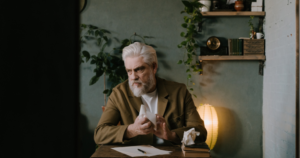A while ago, I found myself spiraling again. You’d think I’d know better by now.
I had thought I had come to terms with some bold, life-affirming decisions I had made—leaving a high-level career, changing locations, and stepping into a new season of life that I had planned for. I’d spent months reflecting, aligning my choices with my values, and preparing mentally for the leap.
And yet, there I was: anxious, overwhelmed, and suddenly doubting everything.
If you’re someone who tends to overthink or ruminate (hello, fellow chronic worriers), you’ll know what I mean. It’s maddening. Because the truth is, even with years of personal development work under your belt—even when you’ve built a life based on authenticity and self-awareness—you can still get knocked over by waves of doubt.
Especially when life throws multiple transitions at once.
That season was a turning point for me. It taught me that mental strength isn’t about “having it all figured out.” It’s about having the tools to come back to yourself—again and again.
These are the seven tools I always come back to when my thoughts run wild and I need to calm the farm, as my country friends would say.
1. Ditch the self-pity (and the “what-ifs”)
One of the biggest energy leaks for worriers? That exhausting loop of what ifs.
What if I made the wrong decision? What if this doesn’t work out? What if I can’t handle it?
The brain, especially under stress, has a negativity bias—it clings to worst-case scenarios as a way to protect us. But ruminating doesn’t protect. It depletes.
Now, when I notice that spiral beginning, I gently interrupt it. I remind myself: “This is the part of me that wants safety, not clarity.”
Then I reframe. I focus on what is, not what if. I tell myself, “This is where I am right now, and that’s enough.”
There’s a quote I keep on my desk: Success is a journey, not a destination. I’ve walked away from the old definition of success—and I’m learning to trust the winding road of reinvention.
2. Calm the catastrophizing by choosing joy
Worry often creates tunnel vision. You get so focused on what could go wrong that you forget how to feel good.
That’s where self-care—real, brain-supporting self-care—comes in.
Instead of doomscrolling or overanalyzing, I interrupt the loop with micro-joys: dancing in my kitchen, having a coffee with a friend, walking under the trees, reading something that makes me laugh.
I also do something I picked up from a podcast from Oprah: I write down one new thing I’m grateful for each evening. It’s a small but powerful act that teaches the brain to notice what’s working.
When you choose to feel joy—even in small ways—you’re signaling to your nervous system that it’s safe to come out of fight-or-flight mode. And that changes everything.
3. Step back and become the observer
In moments of emotional overwhelm, I now have a mantra: You are not your thoughts.
This insight, rooted in mindfulness and confirmed by neuroscience, is powerful. Our brains generate thousands of thoughts a day—most of them repetitive, and many of them distorted when we’re stressed.
Rather than believing every thought, I’ve learned to become an observer. I notice the story my mind is telling me, and then I ask: Is this helpful? Is this true?
A book I always come back to is The Untethered Soul by Michael Singer. It reminds me that the inner voice isn’t me—it’s just noise. And I don’t have to obey it.
Just pausing long enough to breathe, to notice, to witness the mind rather than get swept up in it—that’s where freedom begins.
4. Release the need to please
I spent years being a people pleaser. It was a survival strategy, really—a way to feel safe, needed, and valuable.
But chronic worry and people-pleasing go hand in hand. The need for external validation keeps you trapped in other people’s opinions and expectations.
Now, I practice something different: living from my values. That means tuning in to what matters most to me, even if it’s not always applauded or understood by others.
As I move through this new chapter of hybrid retirement—still creating, still contributing, but on my terms—I’ve realized: the only approval I really need is my own.
5. Remember your resilience
When you’re in the thick of anxiety, it’s easy to forget how strong you really are.
That’s why I keep a journal. It’s not always structured—sometimes it’s a letter to myself, sometimes a brain dump—but it’s always grounding. The act of writing creates distance from the swirl of emotion. It helps me find the story beneath the noise.
Research supports this: expressive writing has been shown to reduce stress, improve clarity, and build emotional resilience.
Sometimes I flip back through old journals and see the evidence in black and white—I’ve faced hard things before, and I made it through. I don’t need to have all the answers now. I just need to take the next step.
6. Talk to yourself like you would a friend
When the inner critic gets loud, I pause and ask: Would I say this to someone I love?
Self-compassion is one of the most underrated tools for mental strength. Dr. Kristin Neff’s work shows that people who practice self-kindness are more motivated, less anxious, and more emotionally resilient.
And I love how Dr. Susan David, author of Emotional Agility, frames it: emotional health isn’t about being positive all the time. It’s about having the courage to feel everything—without shame—and still act in alignment with your values.
That means letting your emotions visit, but not letting them take over the house.
7. Anchor into your values and take aligned action
In my coaching and my own life, I’ve seen this truth over and over: when we live from our values, we feel grounded—even when things feel messy.
That’s why I revisit mine regularly. I ask: Am I still living in alignment? What’s one small step I can take that reflects who I want to be, not just how I feel?
This is also where Acceptance and Commitment Therapy (ACT) has helped. ACT teaches us how to “defuse” from the sticky thoughts that keep us stuck—seeing them as just words, not truths. And from that place, we can choose meaningful action.
In times of uncertainty, I now say: I may not know what’s next. But I do know who I am.
If you’re navigating your own version of change—whether it’s leaving a long-held career, reimagining what retirement could look like, or simply craving more meaning and structure in this next chapter—my course Your Retirement, Your Way: Thriving, Dreaming and Reinventing Life in Your 60s and Beyond can guide you.
It’s built around the idea that retirement isn’t the end of the road—it’s a powerful opportunity to reset, realign, and reimagine your life on your own terms. With six practical, soul-nourishing modules, you’ll explore your values, clarify your purpose, and create a plan for the kind of life you truly want to live. Y
You can join the waitlist or subscribe to The Vessel to find out when it’s released.
Final thoughts: resilience isn’t rigid—it’s responsive
The more I embrace this hybrid retirement life, the more I understand that resilience isn’t about being tough. It’s about being flexible. Responsive. Real.
There are still moments of doubt. But now I see them as part of the process. Not signs of failure, but invitations to recalibrate.
One of the quotes that’s stayed with me over the years is from Viktor Frankl:
“Between stimulus and response there is a space. In that space is our power to choose our response. In our response lies our growth and our freedom.”
That space is where mental strength lives. Not in being perfect. But in choosing again—calm over chaos, clarity over confusion, courage over comfort.
And above all, remembering: this too shall pass.
















